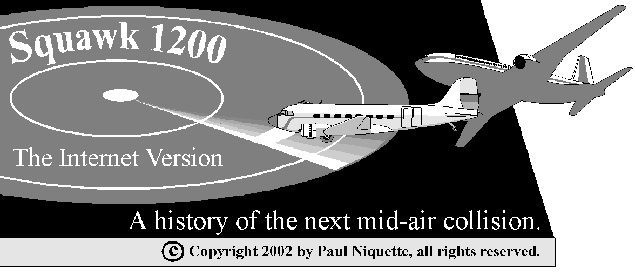

|
Chapter 13 Swamper My objective for the evening was to study the "transition controller," a position in the radar room that managed the hand-off of aircraft between the ARTCC, Air Route Traffic Control Center, and Idlewild Approach. There was no question in my mind that the transponder would benefit this function, inasmuch as an aircraft's identification code assigned by Center could be used as a key for data transfers directly from computer to computer, eliminating the need to transcribe flight strip information manually. I pulled up a chair beside Cliff Grimes. "Where's our Mr. Bonelli tonight?" I asked. "Paperwork," Cliff grumped. He held up his hand, a sign that something was coming in over his headset. I watched him punch up a lighted button and talk briefly by land line to the New York Enroute Center, jotting onto a clipboard. "Vinnie's catching up on paperwork," Cliff continued. "Which means he's replenishing the supplies in the head." I looked around the radar room, which by then had become familiar, as were many of the faces. Whitey Miller was on duty at one of the approach positions, too busy to shake my hand when I walked by. The swamper controller for that shift was a stocky man named Andy Pell. He was standing nearby, tie pulled loose, idly twirling his microphone on the end of its cord. After a time, I could tell that the evening load of air traffic was building. Grimes turned up the speaker for me, and I settled down with my notebook to watch the action. There were more than a dozen types of transactions performed at varying rates by the transition controller. Most of them dealt with the "normal" cases, which in "systems design" invariably turn out to be the easiest to accommodate. It is the exceptions that make for the tough problems. I was paying particular attention to these, hoping to discover a pattern in the errors and corrective actions. What are the procedures used for backing up information -- and for backing out entries? The answer to that question would determine more than anything else the specifications for keyboards and displays. Suddenly, there was a commotion at the far end of the row of radar positions. By the time I turned around, Andy Pell was already on his way. I heard a scream. One of the departure controllers, who was seated next to me, left his position and joined Pell. Grimes dialed the phone. "Better get in here, Vinnie!" he said. "It's Whitey." I stood up, drawn toward the noise. My view was blocked in the dim light, but I knew the voice. Whitey Miller cried out again as if he were in pain. To this day, I can still hear his words. "Christ! Don't give me any more planes!" I stopped, horror-struck at the sight of the man, head in his hands, doubled over, swaying, fingers claw-like. "No more!" he cried. "No goddam more!" Andy Pell reached across to the panel and plugged in his microphone. Still in his chair, Whitey sat up momentarily and forced himself to look at the radar screen. He pointed at one of the blips relentlessly marching toward the center of the screen. His hand trembled. "Get the United back to Point Pleasant!" Pell nodded grimly and put the microphone to his lips. "United 8, discontinue approach; proceed present position to Point Pleasant and hold -- say your altitude." While waiting for the answer, the swamper scanned Whitey's flight strips, then quickly keyed his mike again. "American 42, turn left, heading zero-three-zero; vectors for spacing." The other controllers along the row of radar positions continued their labors, voices low. Each focussed intently on his own flickering sweep, purposely oblivious to the mental disintegration taking place nearby, in keeping with a tradition in contact sports: players turning away from an injured team-mate writhing on the field, giving privacy to the tormented. The departure controller put both hands on Whitey's shoulders, and Pell pushed him aside, earnestly studying the radar screen. "That's Eastern, Andy," Whitey rasped. "Bring him in behind the guy in the gate... God, would you just look at them!" He tore his eyes away. Bonelli appeared out of nowhere and nodded to the departure controller, who tugged gently at the stricken man. "Not yet!" Whitey hollered. Pell crouched down on one knee and re-arranged the flight strips. "Easy does it, Whitey," Bonelli said. He pulled off Miller's headset and arm-locked him from the front. With the aid of the departure controller, Bonelli dragged Miller from the console. Pell wiped at his brow. He worked the stacks, the approach gate -- vectoring, identifying, talking. Always talking. I stood there, captivated for a time by the whirling radar sweep. I gaped at the blips, each an approaching plane descending through the overcast. Unknowing passengers aboard routinely fastened their seatbelts in preparation for landing. Bonelli called my name and, still restraining Miller, motioned for me to pull up a chair for Pell. Whitey Miller was sobbing. |
| Home Page | Table of Contents | Chapter 14 | Contact Author |